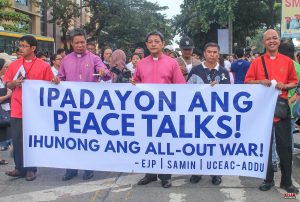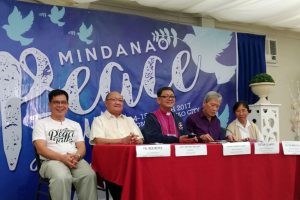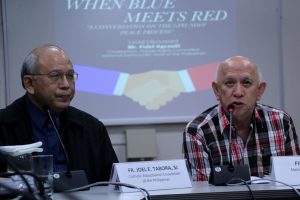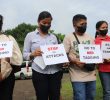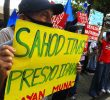DAVAO CITY, Philippines — As national campaigns begin, candidates have begun ticking off their accomplishments and track record to woo votes.
For Sara Duterte, who is seeking election for vice president, what she showcased on the opening salvo of the campaigns needs to be thought of in terms of gains.
Just like her father President Rodrigo did in 2016, Sara presented her own exhibit A of Davao. A city on the rise and a city free of communist insurgency.
“We have brought down decades-long guerrilla movement in Paquibato District in four years,” she told a cheering crowd during her UniTeam proclamation rally in Bulacan on February 7, some 1,000 kilometers away from her city.
Peace 911
The younger Duterte is bragging about her peace initiative called Peace 911, a program she launched in Davao City’s Paquibato district in which supporters believe she will replicate if she captures the national stage.
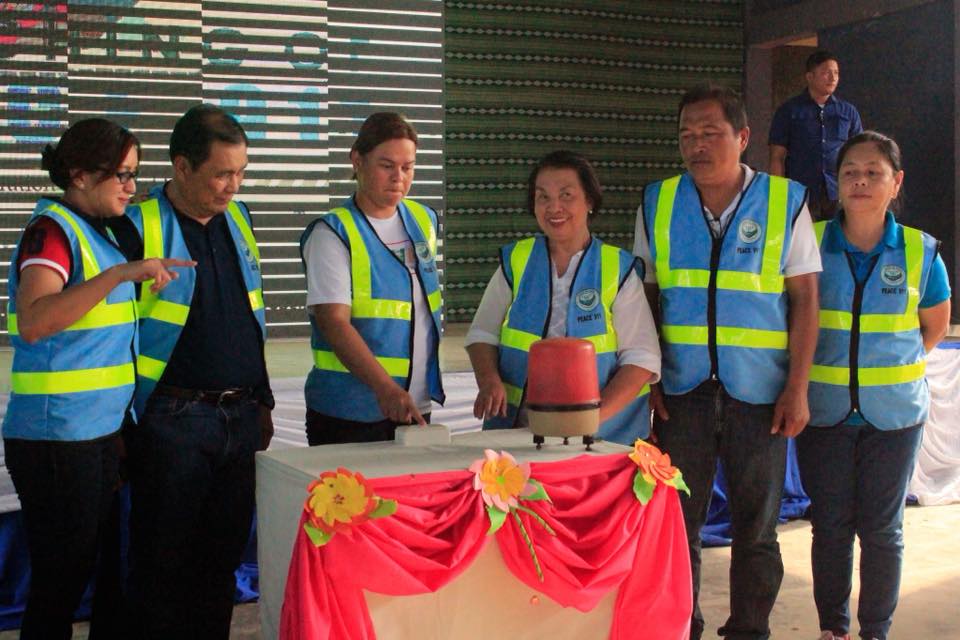
Davao City Mayor Inday Sara Duterte leads the launching of Peace 911 of the Davao City Advisory Committee on Peace and Development (DC Peace-Dev) at Barangay Paquibato Proper, Thursday afternoon, May 17, 2018. (Photo by CIO)
The program took off after the elder Duterte turned back from his engagement to talk peace with the National Democratic Front (NDF) in November 2017, and later signed Executive Order (EO) 70 that launched the government’s “whole of nation” approach to peace and activated the National Task Force to End Local Communist Armed Conflict (NTF-ELCAC).
Peace 911 was launched in Paquibato, a sub-district in the hinterland area of Davao City with a population of around 52,000 in 13 barangays, in May 2018. The area is known as a base of the New People’s Army (NPA) that the late commander Ka Parago headed.
The peace body is headed by Irene Santiago, the former chair of the Government Panel Implementing the Bangsamoro Accords and peace adviser of Mayor Sara.
Peace 911 is said to focus on “social services, infrastructure, livelihood“. One of its programs is the “Peace Economy“, a partnership between farmers of Barangay Malabog and Helen’s Farms of New City Commercial Center (NCCC).
Shutting down talks
During a forum in January 2020, Santiago said that Paquibato District and Barangay Dominga in the neighboring Calinan District have been cleared off members of the revolutionary armed fighters. She said the next challenge is sustain the city government’s peace campaign and focus on empowering the leadership of indigenous peoples.
Sara’s peace campaign, though, has shut the door on talking peace with the NDF.
On some occasions, the mayor called efforts of resuming peace talks or informal talks as “counterproductive and useless,” branding the NDF as terrorists and blaming it for deaths of civilians.
“We maintain our position that we are not supposed to negotiate with terrorists, but deal with them the way we should — tough, strong, high intensity, and one that gathers all sectors to completely crush their influence in communities where they are present,” Duterte-Carpio said in 2019.
Her position is opposite to national candidates for the presidency including Leni Robredo, Ping Lacson, Manny Pacquiao, Isko Moreno and Leody de Guzman, who all said they will commit to re-open the peace talks if they get elected.
- Peace forums and activities with NDF and government peace panels were frequent in Davao City at the start of the Duterte administration but halted after the talks were cancelled and the government went on a “whole-of-nation” approach. (Photo by Kilab Multimedia)
- PEACE ADVOCATES. Panel speakers during the Mindanao Peace Forum held at the Homitori Inn in Davao City on Wednesday, March 15 share light moments with the media and the participants who are mostly religious leaders. (From left to right) Fr. Rex Reyes, convener of the Philippine Ecumenical Peace Platform; Atty. Antonio Arellano, government peace panel member; Bishop Felixberto Calang, convener of the Sowing the Seeds of Peace Movement; Satur Ocampo, independent cooperator for the National Democratic Front of the Philippines peace panel; and Sr. Luz Mallo of the Sisters Association of Mindanao. (Zea Io Ming C. Capistrano/davaotoday.com)
- WHEN BLUE MEETS RED. Jesuit priest and Ateneo de Davao University President Fr. Joel Tabora sits with National Democratic Front of the Philippines spokesman Fidel Agcaoili during a press briefing on Wednesday night. The school organized a forum on the peace process dubbed, When Blue Meets Red, earlier in the afternoon where hundreds of guests from various sectors attended to get a better understanding on the prospect of the GPH-NDF peace process. (Ace R. Morandante/davaotoday.com)
Continuous engagement
Davao City has a history of peace movements initiated by the religious sector, non-government organizations and progressive groups. Their voices have been set aside by the mayor.
Dr. Jean Lindo, chair of Gabriela Southern Mindanao, said the lack of people’s participation is glaring in Sara’s peace campaign. “Peace should be about continuous engagement,” said Lindo.
She points out the mayor’s approach to peace is different from how her father tackled the insurgency before as mayor of the city for three decades.
Rodrigo Duterte was known to travel to the countryside to engage with local NDF and NPA leaders and at times negotiate for the release of captured police and military personnel.
“For a while, then city mayor Rodrigo Duterte was able to demonstrate that peace was possible using the non-militaristic approach. It did work, after all,” Lindo said.
During the first year of Duterte’s presidency when the peace talks was ongoing, Lindo joined forums in schools and barangays initiated by the academe, NGOs and even Duterte’s Kilusang Pagbabago, that invited peace panelists and consultants from both the government and the NDF to firm up the socio-economic reform agenda being discussed in the peace negotiations.
But such activities came to a halt once the NTF-ECAC was launched. Red-tagging and propaganda became more rampant, and even targeted Lindo and peace advocates.
Mayor Sara herself also has repeatedly red-tagged members of the progressive groups and Lumad school members.
As head of the Davao City Peace and Order Council and member of the Regional Peace and Order, she has supported the call for the closure of Lumad schools and the closure of UCCP Haran.
Momentary peace
Another criticism of Sara’s peace campaign is that it focused on one locality.
“The insurgency is not just in Paquibato,” said Bayan Muna Representative and Deputy Minority Leader Carlos Zarate. “Her claims of beating the guerillas is denying the fact that insurgency is everywhere. That peace in Paquibato is momentary.”
Zarate said Duterte’s claim that Paquibato is insurgency-free has been said before.
“In the 1980s, the Philippine Marines led by Biazon said they took over Paquibato, but several years later the guerillas came back,” Zarate said.
The lawmaker said the mayor’s peace campaign is the same paradigm in the past, offering livelihood projects, but will not address the root causes of the armed conflict which includes conflict over land.
“We long for just peace. But there’s no peace if the farmers continue to lose their land. Have they addressed issues of land grabbing, such as the case of their ally, a pastor who is involved in land-grabbing and attacking the Lumad in Davao City?” Zarate was referring to Pastor Apollo Quiboloy, who is endorsing Duterte, but is embroiled in land conflict with community leaders in Calinan.
The lawmaker is also wary that Davao City has the biggest share of the budget in 2021 from the NTF-ELCAC amounting to P4.3 billion in pesos in 2021.
How much of this was spent in Paquibato remains in question.
Meanwhile, Congress has flagged the NTF-ELCAC for its unliquidated funds last year and slashed its budget for 2022.
CPP exposes militarization
The Communist Party of the Philippines (CPP) has criticized Peace 911 for its coercive approach on the people of Paquibato.
In a news article from its website, the CPP said three army battalions were deployed in Paquibato for Peace 911: the 27th, 89th and 3rd infantry battalions.
The CPP said the military conducted mass meetings in Paquibato that subject communities to “force surrender” as NPA supporters and made barangay councils sign declarations that “NPAs are persona non grata.”
The CPP also said the military constructed a “Kalinaw Village” (Peace Village) in Mahayag, Barangay Bunawan to contain the people in Paquibato, and built it near the 1003rd Brigade headquarters.
The project costs P2.53 million and an additional P2.6 million in pesos distributed to 40 persons the military claimed to be NPA “surrenderees.”
The article further described the Peace Economy program as “a duplicate of the old projects of tree-planting and production of raw agricultural materials for export…under the National Greening Program.”
It also said an oil palm plantation is being eyed in Barangay Colasas.
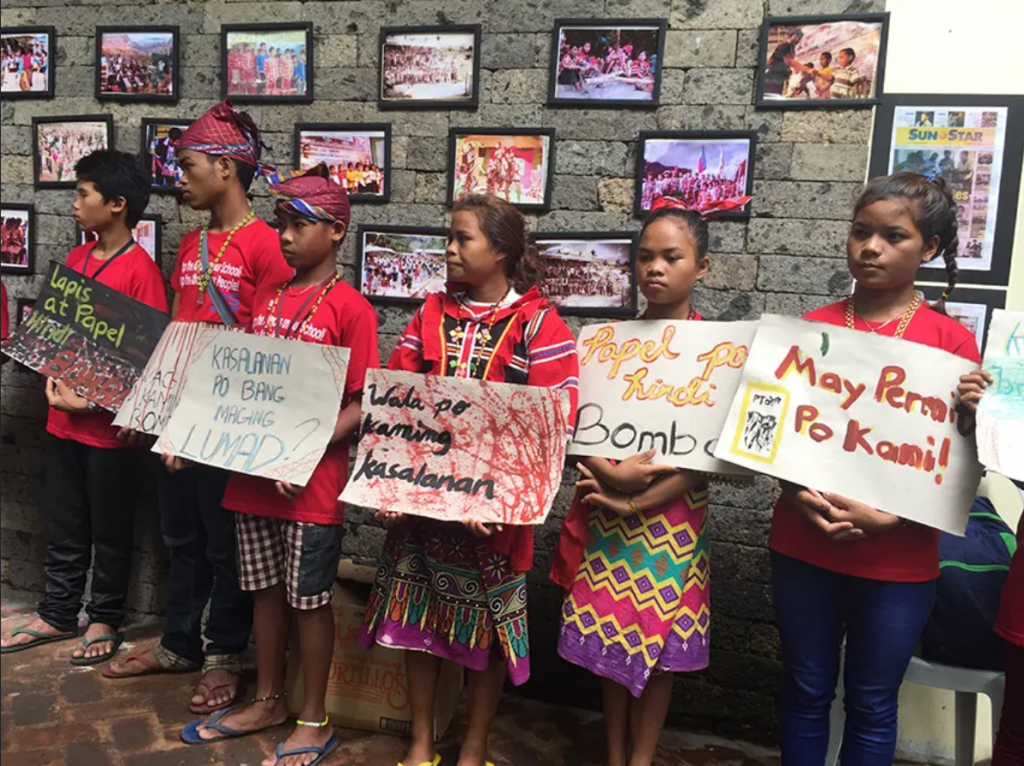
Lumad children, who have experienced militarization, displacement and disruption of their schooling, campaign for peace. (Photo by Lorie Ann Cascaro)
Bibingka approach
Such reports validated Zarate’s observation that Mayor Sara’s peace engagement is actually capitulation.
Development worker Victoria ‘Mags’ Maglana said the problem of dealing with the armed conflict is left to the government and the military which she said have default actions.
She said Duterte’s peace falls to that “now na” approach of “responding to visible and immediate triggers of conflict such as sightings and activities of alleged insurgents, in a manner that neither recognizes nor addresses historical and systemic factors and in ways that are circumscribed by one’s mandates,” she said.
She also pointed out that local actions for peace must not be confined within one city or province, but “needs to be undertaken alongside national actions such as political negotiations, peace agreements, national legislation and systematic executive initiatives.”
Maglana, who has engaged government and security sectors in peace building, also pointed out how the “whole of the nation” policy, which on paper talks of addressing the roots of the conflict, has translated into what the NTF-ELCAC is doing—a militarist mindset.
Maglana said efforts to achieve peace must involve the people.
“When citizens—and not just directly-affected communities—are involved in (and not just informed about) peace initiatives, they become stakeholders of peace. Their vigilance will be important to ensure that conflict and peace actors stay the course of peace instead of opting for war.”
Maglana also likens peace building to cooking bibingka or rice cake, in which the process requires it to be cooked on both top and bottom.
“Bibingkas that are cooked only by fire from below will be underdone and will neither be enjoyed by nor nourish those that consume them.”
Whether Sara Duterte or the next national leaders will take this recipe remains also on the voters who should take Asia’s longest insurgency a closer look. (davaotoday.com)

